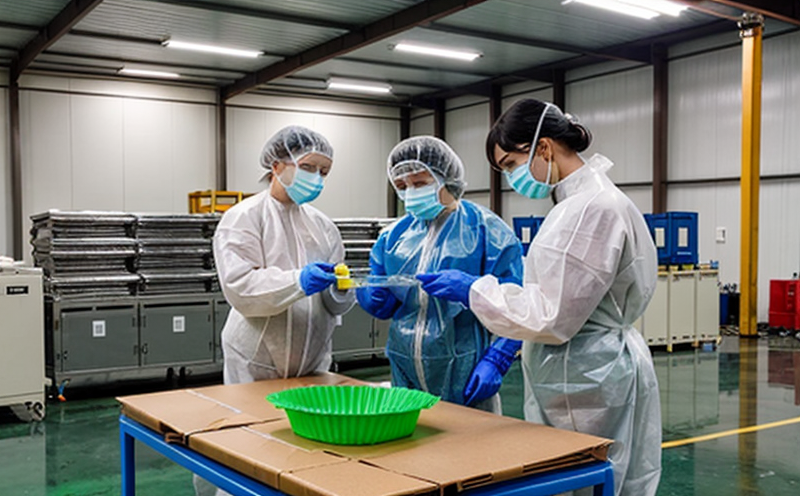ASTM D1709 Impact Resistance of Plastic Film
The ASTM D1709 test method evaluates the impact resistance of plastic films, a critical property for packaging materials that must withstand environmental stresses without compromising their structural integrity. This test is pivotal in ensuring that plastic films used in food and pharmaceutical packaging meet stringent safety standards.
During testing, specimens are subjected to high-velocity impacts from steel spheres falling onto them from a specified height. The impact energy absorbed by the film determines its resistance. Compliance with ASTM D1709 is essential for manufacturers looking to ensure their products can safely endure various conditions without breaking down or compromising on safety.
Quality managers and R&D engineers rely on this test method to validate that plastic films meet specific performance standards set forth by regulatory bodies like the FDA. By ensuring consistent quality, these tests help in maintaining consumer confidence and compliance with international standards such as ISO 178 and ASTM D648.
The testing procedure involves precise specimen preparation and adherence to strict environmental conditions. This ensures that results are accurate and reliable, which is crucial for quality assurance processes in the packaging industry. Understanding how to interpret these tests correctly can significantly improve product development cycles and reduce costs associated with rework or non-compliance.
- Ensures compliance with international standards such as ASTM D1709
- Provides consistent quality assurance for plastic film products
- Helps in maintaining consumer confidence through reliable testing results
- Facilitates accurate interpretation of test outcomes to improve product development cycles
Benefits
The benefits of ASTM D1709 impact resistance testing are manifold for the packaging industry. First and foremost, it ensures that plastic films used in food and pharmaceutical packaging can withstand real-world conditions without breaking down or compromising safety. This enhances product reliability and customer satisfaction.
Secondly, by adhering to this standard, manufacturers can demonstrate their commitment to quality and compliance with regulatory requirements. This is particularly important for companies operating across international markets where local regulations may vary significantly.
Thirdly, consistent testing results help in reducing the risk of recalls due to product failures or non-compliance incidents. Such incidents not only damage brand reputation but also incur significant financial losses. By ensuring that every batch meets the required standards before release into market channels, companies can minimize these risks effectively.
- Ensures reliable performance under real-world conditions
- Demonstrates compliance with regulatory requirements
- Makes recall risks due to product failures or non-compliance lower
Eurolab Advantages
At Eurolab, we pride ourselves on offering comprehensive packaging testing services that go beyond just ASTM D1709. Our state-of-the-art facilities and experienced team ensure that every test conducted adheres to the highest standards of accuracy and precision.
We utilize advanced instruments calibrated according to international norms to provide precise measurements during impact resistance tests. Our methodologies are designed not only to meet but exceed industry expectations, giving our clients peace of mind knowing their products are thoroughly evaluated.
Our commitment extends beyond just testing; we also offer detailed reports and recommendations based on our findings. These insights help manufacturers optimize material selection and processing techniques, leading to improved product performance and reduced waste throughout the production process.
- State-of-the-art facilities for precise measurements
- Advanced instruments calibrated according to international norms
- Detailed reports and recommendations based on findings
Use Cases and Application Examples
The ASTM D1709 impact resistance test is widely used across various sectors, including food packaging, pharmaceuticals, electronics, and consumer goods. Here are some key examples where this testing plays a crucial role:
- Food packaging: Ensuring that plastic films used in food packaging can withstand the rigors of transportation and storage without compromising on safety or integrity.
- Pharmaceuticals: Evaluating the impact resistance of blister packs, sachets, and other forms of packaging to ensure they meet stringent regulatory requirements.
- Electronics: Testing the durability of plastic enclosures used in electronic devices under various environmental conditions.
- Consumer goods: Assessing the robustness of plastic containers for personal care products like shampoos, lotions, and deodorants.





